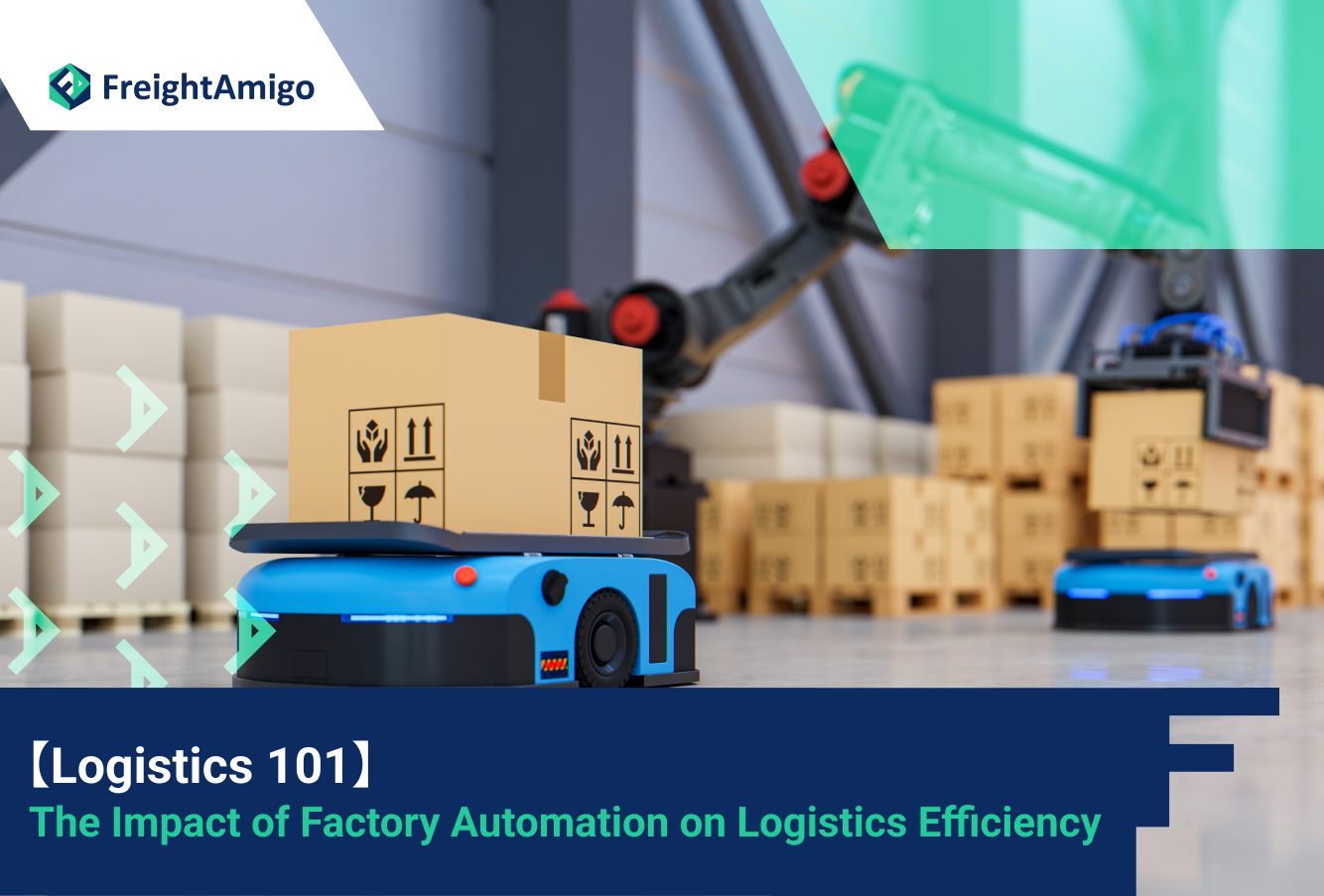Author Name: Tiffany Lee – Marketing Analyst at FreightAmigo
In today’s fast-paced business landscape, logistics companies are constantly seeking innovative solutions to improve efficiency, reduce costs, and enhance supply chain visibility. One solution that has gained significant attention is factory automation. By leveraging advanced technologies and machinery, logistics companies have the opportunity to optimize their supply chain processes, increase operational efficiency, and stay ahead in the competitive market.
Want To Compare The Best Express, Air Freight, Sea Freight, Rail Freight & Trucking Rates So As To Have Better Control On Cost?
The Rise of Automation in Logistics
Automation in logistics refers to the use of technology and software to automate various processes and tasks involved in the movement and storage of goods. This includes transportation, warehousing, inventory management, order processing, and more. Over the years, automation has played a crucial role in transforming the logistics industry, and its importance continues to grow.
Benefits of Automation in Logistics
One of the key benefits of automation in logistics is increased accuracy and efficiency in data management. By automating data entry processes, such as barcode scanning or RFID tagging, logistics companies can ensure accurate and real-time updates of inventory records. This not only reduces the chances of errors but also provides valuable insights for forecasting and improving overall operational processes.
Another significant advantage of automation is the ability to streamline and expedite various tasks. Repetitive and time-consuming activities, such as order processing, pick and pack systems, and inventory management, can be automated, freeing up human resources to focus on more value-added tasks. With automation, companies can process orders faster, print waybills efficiently, verify payments automatically, and handle larger volumes of orders seamlessly.
Automation also helps in reducing errors and improving overall quality control. Manual data entry is prone to mistakes, which can lead to revenue losses and customer dissatisfaction. By implementing automation solutions, logistics companies can minimize errors caused by human factors, such as duplication, inaccurate customer information, or incorrect order fulfillment. Additionally, automation enables immediate identification and resolution of errors, saving time and resources.
Moreover, automation provides comprehensive control and visibility over the supply chain. Real-time tracking and sharing of information enable effective communication and collaboration between various stakeholders. This leads to better coordination, reduced delivery times, and improved customer service. With automation, companies can customize software solutions to align with their specific business processes and policies, ensuring consistent access to essential data for internal and external staff.
The Impact of Automation on Customer Experience
In addition to the internal benefits, automation in logistics also has a significant impact on the customer experience. A streamlined and automated supply chain enables faster order processing, resulting in same-day deliveries and improved customer satisfaction. With accurate product picking and efficient processes, logistics companies can ensure that the correct items are shipped to customers, reducing the chances of errors and returns. Real-time location and status updates provide transparency and visibility to customers, enhancing their trust and loyalty.
The Role of Technology in Automation
Various emerging technologies are driving the automation revolution in logistics. The Internet of Things (IoT) connects devices, tools, and databases, enabling seamless data transfer and communication. IoT has become more affordable, allowing even small businesses to be connected within the logistics network. Drones, although still in their early stages, have the potential to revolutionize delivery systems, especially for customers in remote or hard-to-reach areas. Robotic arms are being used in offloading centers and warehouses to efficiently handle heavy loads. Artificial Intelligence (AI), machine learning, and algorithms leverage data from software solutions to optimize processes such as demand forecasting and efficient shipping routes.
Overcoming Challenges and Embracing Automation
While the benefits of automation in logistics are evident, there are challenges that companies need to address when embracing this technology. One challenge is the competitive dynamics of the e-commerce industry. E-commerce companies have significant buying power and often have their own logistics capabilities. Logistics companies must carefully navigate these dynamics to ensure a mutually beneficial partnership.
Another challenge is the uncertainty surrounding which technologies will prevail in the long run. With numerous automation technologies available, logistics companies must make informed decisions to avoid investing in obsolete or incompatible equipment. The purchasing process itself can be a challenge, as leading automation manufacturers may have full order books, limiting the availability of quotes and creating delays in acquiring the necessary equipment.
The shift towards omnichannel distribution schemes also poses challenges. Logistics companies need to adapt to the changing demands of shippers, who are increasingly offering multiple channels for purchasing and receiving goods. This requires flexibility and agility in logistics operations to meet customer expectations during peak periods.
Lastly, logistics companies often face a discrepancy between the length of contracts with shippers and the longer lifetimes of automation equipment and distribution centers. This misalignment can create financial risks and impact the return on investment for automation projects. Companies must carefully assess contract terms and plan for long-term sustainability.
Strategies for Success in the Automated Logistics Landscape
To thrive in the automated logistics landscape, companies should consider the following strategies:
1. Invest in research and development: Stay informed about the latest automation technologies and their potential impact on the industry. Continuously evaluate and assess which technologies align with your business objectives and customer demands.
2. Foster collaborations and partnerships: Form strategic alliances with technology providers, e-commerce companies, and other stakeholders in the logistics ecosystem. Collaborative automation can lead to mutually beneficial outcomes and drive innovation.
3. Prioritize employee training and upskilling: As automation transforms job roles, invest in training programs to equip employees with the necessary skills to work alongside automated systems. Emphasize the value of human expertise in decision-making, problem-solving, and customer service.
4. Optimize internal processes and workflows: Conduct a thorough review of existing processes and identify areas that can be automated to improve efficiency and reduce costs. Implement automation solutions gradually, ensuring smooth integration with existing systems.
5. Enhance supply chain visibility and customer experience: Leverage automation technologies to provide real-time tracking, status updates, and personalized customer service. Focus on delivering a seamless and transparent experience throughout the entire supply chain.
6. Stay agile and adaptable: Continuously monitor industry trends, customer demands, and technological advancements. Be prepared to adjust strategies and adopt new automation solutions as the logistics landscape evolves.
Conclusion
Automation in logistics holds immense potential to revolutionize the industry. By leveraging advanced technologies and embracing automation, logistics companies can improve efficiency, reduce costs, enhance supply chain visibility, and deliver exceptional customer experiences. However, companies must navigate the challenges and uncertainties associated with automation, carefully assessing their strategies and investments to ensure long-term success in the automated logistics landscape. With the right approach and a commitment to innovation, logistics companies can position themselves as leaders in the industry, driving growth and delivering value to their customers.
There Are Different Options For Cargo Transportation. If You Want To Choose The Most Convenient And Suitable Solution, It Is Best To Have The Full Support Of Logistics Experts! If You Are Planning To Ship Goods Overseas, Please Go To The FreightAmigo Page For Inquiries.
===
Read More:
【Export of USA】 A Gateway to Success and Global Economic Influence
The Key Trade Partners of the USA: Boosting International Commerce
【Export of USA】 US-China Trade War’s Influence on USA’s Export Industry
===
If you have any inquiries on logistics/supply chain, feel free to contact FreightAmigo now:
Chat with us online OR
Phone : +852 28121686
WhatsApp: +852 27467829









































